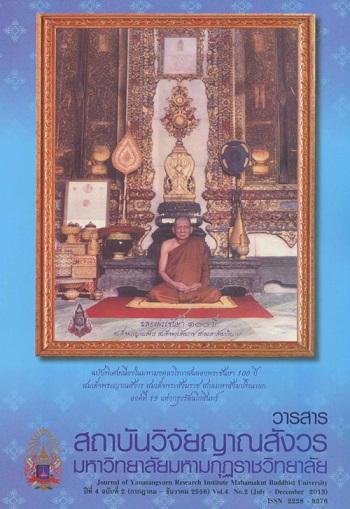A Study of Buddhist Activities in Primary Schools of Bangkok Metropolitan Administration, Academic Year 2008
Main Article Content
Abstract
The objective of study of Buddhist Activities in Primary Schools of Bangkok Metropolitan Administration, Academic Year 2008 was to study concept of activities, the problem of activities management and to find the approach and developmeant of the Buddhist activities. The Methodology was focused in 50 Buddhist Schools of Bangkok Metropolitan Administration. The research’s population was divided into 4 groups; (1) 75 school’s executives, 125 teachers, 75 monks and 1,250 students. The collected data was divided into 3: (1) The interviews were divided into three groups: 25 school’s executive, 19 teachers and 27 monks. (2) The questionnaires were distributed through two groups: 183 out of 200 of school's executive teachers and monk were returned (91.5%), 1,125 out of 1,250 students were returned (90%). (3) Focus-group was managed 5 times. The data analysis was divided into 2: (1) General data were analyzed by frequency and percentage, the level of satisfactions and practices were analyzed by mean and standard deviation. (2) Other opinions in survey, interviews and focus groups were arranged, indexed, and analyzed by content analysis. The results were found as follows: 1.Order of activities’ groups were days and week activities, curriculum integrated activities, public relation activities and special activities. Order by most important activities was to pay respect to teacher ceremony, mother-father day ceremony, National religion and king recall, walk with lighted candles in hand around the temple, pray with mercy and meditate, the rainy candle flock in Buddhist Lent day, and New year merit ceremony. 2.The problem of activities management in schools’ executive’s viewpoints was divided into 3: Personnel; (1) lack of personnel who is able in religion field, teaching with psychology and able to manage knowledge process. (2) Building and environment; some school are small with less activities field, some placed in crowded community with unsuitable environment. (3) Student; most of student came with unwished behavior whose was trained for long time. The problems in viewpoints of teachers and monks were divided into 3: (1) Management; should adjust quality for increasing numbers of activities related time that can reduce academic. (2) Personnel; teacher’s jobs increase by preparing knowledge process and activities, many teachers were not well known in Buddhist School style and was able to be effective to integrated knowledge process for student. (3) Student; students can be bored with case of doing activities many time, and environment around school can tempt students to unwished behavior. 3.The approach and develop meant of the Buddhist activities in schools’ executive’s viewpoints were divided into 3: (1) Activities; they should be carried by harmoniously adapting through integrated activities, day and week activities. (2) Personnel and supported clients; the government should support and promote knowledge in Buddhist school style for personnel who had relation in educational field including monks, promotion to research in classes, management of public-relation in HTS (Home Temple and School) principle by promoting participation in building Buddhist way society. (3) Students; should foster the discipline, promote activities which support whished behavior, integrate Buddhist principle especially Tri-sikkha or the Threefold Learning in curriculum through day and week activities. The approach and develop meant of the Buddhist activities in teacher’s and monk’s viewpoints were divided into 3: (1) Activities; they should be done more seriously and continually, promoted harmoniously with Thai way, focus in learning, proper eating, living watching and listening. (2) Personnel; they should focus in integrated activities through planning, making action plan, integrating in all group of learning principles, making harmoniously consciousness in lay disciple, and should be role model for students. (3) Building and environment; they should be adapted and matched with Buddhist school style, focused in clean calm and come to light or wisdom
Article Details
References
พระธรรมปิฎก (ป.อ. ปยุตฺโต). สู่การศึกษาแนวพุทธ. พิมพ์ครั้งที่ 2. กรุงเทพมหานคร: โรงพิมพ์องค์การรับส่งสินค้าและพัสดุภัณฑ์, 2546.
พระเทพโสภณ. โรงเรียนวิถีพุทธเพื่อสังคมไทย. ในโรงเรียนวิถีพุทธ, พระศรีธวัชเมธี(บรรณาธิการ), พิมพ์ครั้งที่ 1. กรุงเทพมหานคร: โรงพิมพ์มหาวิทยาลัยมหาจุฬาลงกรณราชวิทยาลัย, 2547.
หน่วยศึกษานิเทศก์ สำนักการศึกษา กรุงเทพมหานคร. สรุปการดำเนินงานศึกษาและพัฒนาโรงเรียนวิถีพุทธ วิถีธรรม ปีการศึกษา 2550. กรุงเทพมหานคร: ชุมนุมสหกรณ์การเกษตรแห่งประเทศไทย, 2551.


